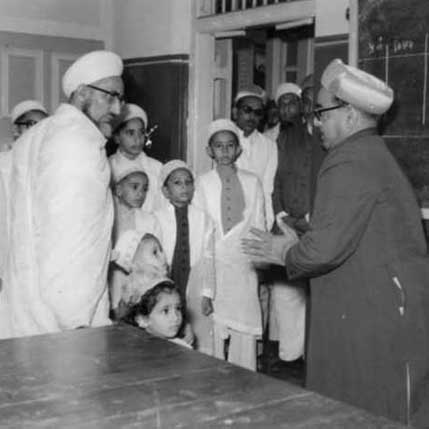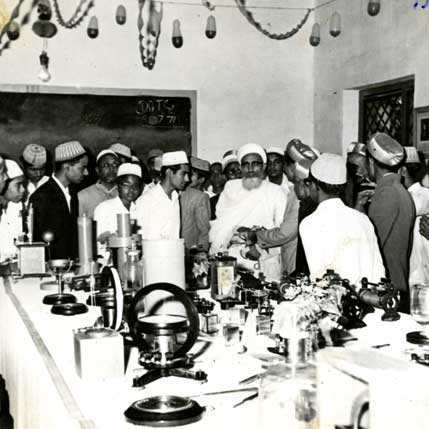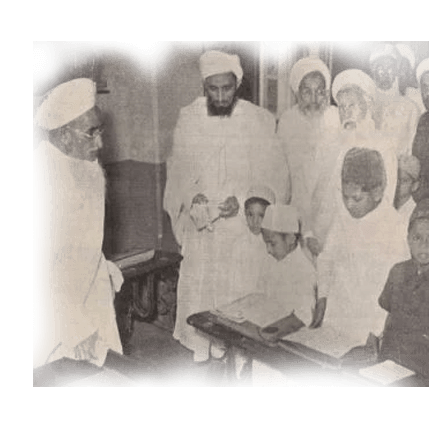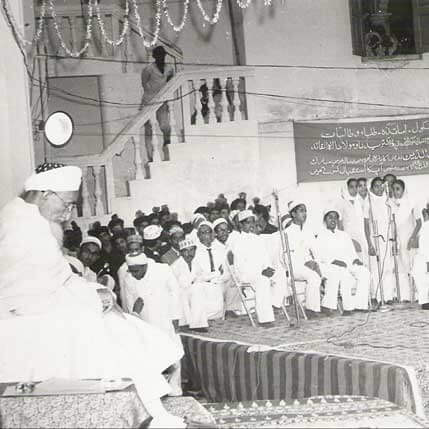Vision

“Education should be imparted from a correct Islamic standpoint;
- To prepare a mumin mukhlis should be its target
- Obedience for Aal-e-MohammedSAW should be its ultimate goal
- Eternity and salvation should be its fruit and essence”

“An alumnus (of an Imani school) should graduate as a seeker of Ilm (knowledge); a mumin (believer); a reverent (of Dai al Zamān); sincere; having noble character; worshipper; and one who dedicates his life for the service of Dai al Zamān, community and humanity.”
Mission
Attalim Schools nurture and bring forth from within the highest potential of each child, leading to prosperity and accomplishment in this world and the hereafter. (Takamul-e-Shakhsi: A Well-rounded Personality).
- The curriculum of Attalim Schools transforms students through building skills, attitudes and conceptual understanding. It does not merely transfer knowledge. This is with the objective to make them ideal citizens dedicated to the service of his/her community and nation.
- Attalim Schools support and promote students’ endeavours for academic excellence (Ilm), meaningful practice (Amal), character refinement (Akhlaq), and moral virtue development (Aqida). The application of these values in daily life, and in the service (Khidmat) of Da’wat and humanity results in Takāmul-e-Shaksi: A Well-rounded Personality.
- The depth and vastness of Ilm-e-Aal-e-MohammedSAW make it all-inclusive and comprehensive; hence the curriculum standards for all knowledge and guidance for all actions are derived from the life and teachings of Awliyā KirāmAS, in the light of the Qur’an and the Shari’at. From this very same perspective, we explore all spiritual and material knowledge and concepts and this is what is termed as the Muntalaq Islāmi, the Islamic Perspective.
- Attalim Schools assert that the essence of all knowledge is the remembrance of al-Imam al-HusainSA and his sacrifice for Islam and humanity.
- Attalim Schools nurture and bring forth from within the highest potential of each child; authentic education aims to manifest the potential that is latent within human beings, and therefore, Attalim Schools view every child as a seed that can one day rise up to be a tree.
- Attalim Schools create platforms and processes to align and integrate the four centres of learning in a child’s life – Manzil (home), Masjid, Madrasa (school), and Mujtama (society); we believe that for education to be compelling, it must be actively supported by all four of these centres seamlessly and consistently.

- Attalim Schools ensure seamless integration of spiritual and material knowledge and understandings. The curriculum is designed in light of the Qur’an and the Shari’at. It addresses all the developmental areas that make up the whole child, which include social, cognitive, physical, emotional, and spiritual well-being. The memorisation of the Qur’an is a powerful tool in promoting such development.
- Attalim Schools support their faculty members to exemplify their core values and beliefs to the students. They facilitate student learning by designing experiences that promote multi-sensory engagement in age-appropriate tasks that are meaningful and applicable to their daily lives. Faculty members strive to create a safe environment conducive to learning, where students are free to take risks and challenge themselves without fear of failure.
Aim
Attalim Schools aim to develop takāmul-e-shakhsi in each child.

Organisational Values
The organisational values of Attalim Schools drive and foster a conducive and productive work culture. They are as follows:
- Collaboration: Attalim Schools are a learning community where all engaged parties work collaboratively and grow continually. This includes all stakeholders – students, parents, teachers, administrators, community members, and the school neighbourhood.
- Effective Resource Allocation & Utilisation: Attalim Schools will make available adequate & suitable infrastructure and human, intellectual and financial resources to facilitate their learning-community’s needs.
Organisational Values
The organisational values of Attalim Schools drive and foster a conducive and productive work culture. They are as follows:
- Collaboration: Attalim Schools are a learning community where all engaged parties work collaboratively and grow continually. This includes all stakeholders – students, parents, teachers, administrators, community members, and the school neighbourhood.
- Effective Resource Allocation & Utilisation: Attalim Schools will make available adequate & suitable infrastructure and human, intellectual and financial resources to facilitate their learning-community’s needs.
Lines of Action
“Attalim”, the Education Administration of His Holiness Syedna Aali Qadr Mufaddal SaifuddinTUS establishes and manages Imani Schools, Training Centres and Hostels, that represent its vision, mission, and values.

- Design, execute, monitor, and support the implementation of academic and administrative policies and procedures.
- Provide leadership and oversee the professional development of concerned stakeholders.
- Conduct programmes to ensure the academic growth of all schools.
- Establish systems for effective communication with all stakeholders.
- Tackle and remedy inadequate teaching practices.
- Arrange & enforce effective crisis management, both during and after a crisis, in order to solve root causes.
- Manage and align resources.
Financial Model
Attalim Schools are not for profit organisations established with the purpose and responsibility of ensuring equitable and inclusive access to quality education as per its vision & mission. It is the parents’ legal and moral responsibility and duty to pay the fees as per the school policies and protocols. The fees enable Attalim Schools to improve their services and programmes and make them accessible and sustainable to continue creating possibilities and building futures.
A brief History of Attalim Schools
At the time of al-Dai al-Ajal Syedna Taher SaifuddinRA’s accession to the august office of al-Dai al-Mutlaq, there were community – led educational institutions in fourteen towns and cities.
With the determined efforts of the 51st Dai al-Mutlaq, Dawat-e-Hadiyah achieved steady and significant progress in the field of education, and the benefits of these efforts were reaped by Dawoodi Bohra students and others in India as well as abroad.
The first Imani School’s foundation stone in Jamnagar bears the following date: 20 April 1920 AD, 2 Shaban al-Karim 1338, Tuesday.
By 1340 AH, Syedna Taher SaifuddinRA had established ten more educational institutions. In this period, the Education Department of Dawat-e-Hadiyah developed the syllabus and the administrative regulations. By 1355 AH, the total number of community-led educational institutions had risen to fifty-three. By 1360 AH, the number stood at one hundred and forty-two, and by 1377 AH, two hundred and seventy-eight functional educational institutions were serving the community.
On the auspicious occasion of the Milad of Amir ul Mumineen Maulana Ali ibn Abi TalibSA on the 13th of Rajab 1377 AH, the educational department was renamed from al-Sighah al-Ilmiyyah to its current name, the Da’erat ut-Tarbiyat wal-Ta’lim.


At a time when others were oblivious to the benefits of higher education, al-Dai al-Ajal Syedna Taher SaifuddinRA proclaimed the essential principles of higher learning to the world. While his advice was aimed towards the Muslim community and humanity at large, mumineen were exceptionally fortunate to have received guidance for integrating dini and dunyawi education in an unprecedented show of educational revival, revolution and transformation in the community.
The Da’erat ut-Tarbiyat wal-Ta’lim office space was upgraded and brought up to modern standards. Al-Dai al-Ajal Syedna Taher SaifuddinRA personally assigned the syllabus for classes up to Grade 4 in the June of 1958.
On the Milad of al-Dai al-Ajal Syedna Mohammed BurhanuddinRA, Syedna Taher SaifuddinRA
announced the establishment of a teachers’ training institute “Mahad al-Talim al-Saifi” to improve the quality of teaching.
A series of training programs continued after that, and Syedna Taher SaifuddinRA kept blessing these programs with his guidelines and instructions.
His son and successor al-Dai al-Ajal Syedna Mohammed BurhanuddinRA was an integral part of these efforts. He regularly visited training programmes during the time of Syedna Taher SaifuddinRA and routinely delivered speeches. He had famously stated that:
Piety, discipline, and devotion are fundamental to the khidmat of education.
Syedna Taher SaifuddinRA established two hundred ninety-seven educational institutions by the year 1381 AH. This number included:
- Three colleges in Bhopal, Sidhpur, and Burhanpur;
- Two higher secondary schools in Indore and Bhopal;
- Two technical schools in Mumbai and Surat; and
- Seventeen high schools in various towns and cities.
Al-Dai al-Ajal Syedna Mohammed BurhanuddinRA was known for his gracious and compassionate approach towards the education and upbringing of mumineen students.
In 1398 AH, on the occasion of the inauguration of the Zariḥ Mubarak of Maulatuna ZainabAS, the Mahad al-Tarbiyat al-Zainabiyah was inaugurated for providing training to muminaat who were interested in taking up dīnī taʿlīm as a profession.
Whenever al-Dai al-Ajal Syedna Mohammed BurhanuddinRA travelled to bilād imaniyah, he sought reports from the local madrasas and schools and accordingly issued directives and guidelines to rectify or improve existing conditions. Each visit included a programme organised by or for the students of schools or madrasas. Syedna BurhanuddinRA used to spend long hours observing and reviewing the educational affairs of these children. He then used to deliver bayan mubarak and heartily appreciate the children’s efforts and those of their teachers. He has delivered numerous bayans on the principles and reverence of dīnī taʿlīm. He established community-led educational institutions in even the remotest of places where mumineen resided to ensure universal, equitable, and inclusive access to quality education for all.
Moreover, Imani Schools and colleges were established aplenty. He directed that madrasas, as educational institutions, be run in the courtyards of masjids, community centres, community halls, pilgrimage places (mazarat muqaddasah), and even houses of mumineen. Hundreds of beautiful buildings were built to serve as madrasas, schools, and accommodation for visiting moallemeen. These efforts resulted in a remarkable increase in the number of students enrolling for dīnī taʿlīm.

